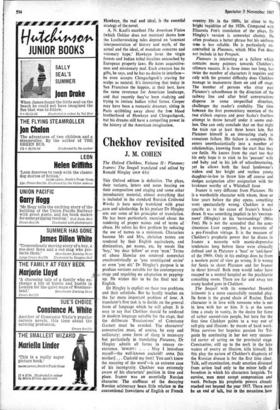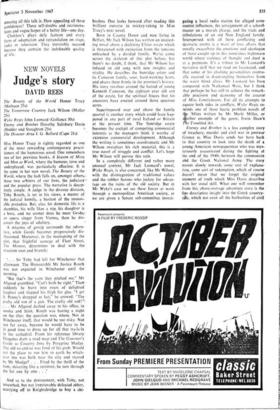Chekhov revisited
J. M. COHEN
This Oxford edition is definitive. The plays, their variants, letters and notes bearing on their composition and staging and some other introductory material, almost everything that is included in the standard Russian Collected Works is here newly translated with great care and scholarship. In his preface Dr Hingley sets out some of his principles of translation. He has been particularly exercised about the rendering of proper names and of terms of abuse. He solves his first problem by reducing the use of names to a minimum. Characters become Mr and Mrs, christian names are rendered by their English equivalents, and diminutives, pet names, etc, by words like 'boy,' my dear fellow' or even 'man.' Terms of abuse likewise are rendered somewhat anachronistically as 'you unmitigated swine' or even 'you nit.' Dr Hingley's purpose is to produce versions suitable for the contemporary stage and requiring no adaptation or pepping- up. He wishes this to be the final text in English.
Dr Hingley is explicit on these two problems and their solutioAs. But he hardly touches on the far more important problem of tone. A translator's first task is to decide on the general form of language which he will adopt. It is easy to say that Chekhov should be rendered in modern language suitable for the stage, that the deliberate aussianisms' of Constance Garnett must be avoided. The characters' conversation .must, of course, be easy and unliterary; some form of slang is necessary but particularly in translating Platanov, Dr Hingley admits all forms in uneasy co- existence. `SERGEY . . . May I introduce myself—the well-known cuckold! ANNA [his mother] ... Cuckold my foot! You can't know the meaning of the word'—is an extreme case of his incongruity. Chekhov was extremely aware of his characters' position in time and place. Ivanov was an essentially Russian character. The stuffiness of the decaying Russian aristocracy bears little relation to the conventional frowstiness of English or French
country life in the 1880s, let alone to the bright vapidities of the 1920s. Compared with Elisaveta Fen's translation of the plays, Dr Hingley's version is somewhat chancy. He often produces a better phrase but his uniform
to is less reliable. He is particularly un- controlled in Platanov, which Miss Fen does not include in her Penguin.
Platanov is interesting as a failure which contains many pointers towards Chekhov's ultimate success. It is three times too long, has twice the number of characters it requires and only with the greatest difficulty does Chekhov manage to manoeuvre them on and off stage. The number of persons who stray past Platanov's schoolhouse in the direction of the railway line and after brief conversations disperse in some unspecified direction, challenges the reader's credulity. The time between the first premonitory mention of the two o'clock express and poor Sasha's fruitless attempt to throw herself under it seems end- less. One can only conclude that on that night the train ran at least three hours late. But Platanov himself is an interesting study in conscious failure. His failure is complete. He enters unenthusiastically into a number of relationships, knowing from the start that they are futile. He knows from the start too that his only hope is to stick to his 'peasant' wife and baby and to his job of schoolmastering, yet he allows both the local landowner's widow and her bright and restless young daughter-in-law to throw him off course and dodges assignation after assignation with the briskness worthy of a Whitehall farce Ivanov is very different from Platanov. He is a worthwhile character with whom, three or four years before the play opens, something went spectacularly wrong. Chekhov is not specific as to the cause of Ivanov's break- down. It was something implicit in his 'environ- ment' (Hingley) or his 'surroundings' (Miss Fen). He is not the scoundrel that the sanc- timonious Lvov supposes, but a neurotic of a pre-Freudian vintage. It is the measure of Chekhov's prophetic power that he draws in Ivanov a neurotic with manic-depressive tendencies long before these were clinically defined and in Platanov a 'beat' or 'anti-hero' of the 1960s. Only in his endings does he from a modern point of view go wrong. It is wrong for Sonia to shoot Platanov and for Ivanov to shoot himself. Both men would today have escaped to a mental hospital or the psychiatric consulting room. There are far and away too many loaded guns in Chekhov.
The Seagull with its somewhat Ibsenish leitmotiv is a more successfully rounded play. Its form is the grand chain of Racine. Each character is in love with someone who is not in love with her or him. It is at the same time a study in vanity, in the desire for fame of rather second-rate people, but here for the first time Chekhov points to a way out of self-pity and illusion: by means of hard work. Nina survives her hopeless passion for Tri- gorin by continuing in her not very success- ful career of acting on the provincial stage. Constantine, still up to the neck in the lake waters of poetry or illusion, kills himself. In this play the nature of Chekhov's diagnosis of the Russian disease is for the first time clear. Talk, self-examination, ready emotion divorced from action lead only to the minor hells of boredom in which his characters languish. To survive, men must accept compromises and work. Perhaps his prophetic powers already reached out beyond the year 1917. There must be an end of talk, but in the meantime how
amusing all this talk is. How appealing all these confidences! These self-doubts and recrimina- tions and vague hopes of a better life—one day. Chekhov's plays defy fashion and every form of adaptation and retranslation on stage, radio or television. They inevitably succeed because they contain the indefinable quality of life.











































 Previous page
Previous page